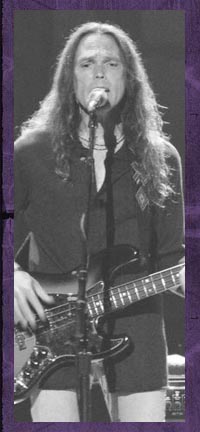An Eagle's Lofty Perch
Timothy B. Schmit remembers jumping from one influential country-rock group to another
Author:
Bernard Perusse
Publication: Montreal Gazette
Date: July 28, 2005
Abstract: Interview where Schmit discusses his past experiences in country-rock bands, among other things. There is also an alternate version of this article entitled "Eagles In It for the Long Run".
MONTREAL - What are the odds of one man replacing the same person in two of country-rock's most influential bands?
That's exactly what Timothy B. Schmit did. When Randy Meisner left Poco in 1969, Schmit took over the bass player's slot. History repeated itself in 1977, when Meisner quit the Eagles and the group hired Schmit.
On the phone to promote the Eagles' new live DVD, Farewell 1 Tour: Live From Melbourne, Schmit illustrated the difference between the two groups -- both in musical approach and in attitude -- by remembering a revealing incident.
He remembers driving to a U.S. gig while in Poco when Hotel California was out -- "when you couldn't turn on the radio without hearing an Eagles song."
Schmit said Poco was somewhat of a front-runner country-rock band at the time, but they watched the Eagles "sail right by us." One band member shook his head in disgust and frustration, and it was clear to Schmit why the Eagles were getting airplay and Poco wasn't: "It was simply that they had better songs. They were more radio-friendly, they were better-crafted, they were catchier, the subject matter was more intense. Although I was frustrated, too, by not being on the radio, I totally understood it."
Within a year, Schmit had joined the Eagles. In 1979, he played on The Long Run, which featured I Can't Tell You Why, an Eagles song he co-wrote with Don Henley and Glenn Frey. Two years later, the group called it a day -- for 13 years.
Chief Eagles Frey and Henley went on to successful solo careers, and their hits, such as The Boys of Summer, You Belong to the City and Dirty Laundry, are now integrated into the group's repertoire. Schmit said the songs fit naturally. "We've been doing some of those songs for a long time -- and many of them probably would have been on an Eagles album had we not broken up," he said.
The group reunited in 1994 and continues to sell out arenas. The new DVD shows that they also draw a more youthful crowd than many of their contemporaries. For Schmit, the secret of the Eagles' mega-fame is disarmingly simple.
"I think it's the songs themselves," he said. "You could be incredibly talented as a singer, but without the vehicle of a great song, you would be lacking. I think the Eagles have many, many great songs, and I think it filters down among a few generations now."
But what is it about those songs? "If I actually knew the answer to that, I could just write 10 of those every day," he said. "They're simply well-crafted, largely due to Henley and Frey. They had something. It was Lennon-McCartney-like."
The concert DVD sets out to bring its own answers into your home, but it raises a question: Was there any point in paying to see the group -- with sound and visuals that could never come close to the brilliantly produced DVD? In fact, can a live DVD give us the best picture of what a band sounds like in concert -- in 5.1 Surround, in our own living room?
Schmit fielded that one carefully, eager to praise the DVD's technical accomplishments, but keen to give fans a reason to keep buying concert tickets.
"Nothing can replace a live concert," he said. "I think that's what's going to save any act from the revenues that they are losing -- that we are all losing -- from piracy, from technology and from lack of record sales. I don't care how good the DVD is -- and I share the feeling that this is an excellent-quality product that we have put out -- I still don't think it can replace a live concert. I don't think people will stop coming."
Even at Eagles prices? The group has been among the acts frequently criticized for their high ticket costs -- and although you can't see Schmit rolling his eyes over the phone, you sense he's tired of defending those charges.
"We don't force anybody to buy a ticket," he said. "They pay the money of their own free will. And because of that, we work really hard. We give them three-plus hours of our time and our energy. I hear people say all the time, 'Wow, I thought this was a lot of money, but it was worth it.'"
Money aside, the once-troubled band seems to be having fun on stage again, and Schmit cautiously confirmed it. "We don't really socialize that much anymore when we're not together," he said.
"We get together as professionals to work. When you can forget about the big business machine that it's turned into, and the money and the travelling and all that aspect of being on tour, and you're actually on stage doing what you wanted to do in the first place -- when you first got interested in it -- it's fun. And we do enjoy it."

